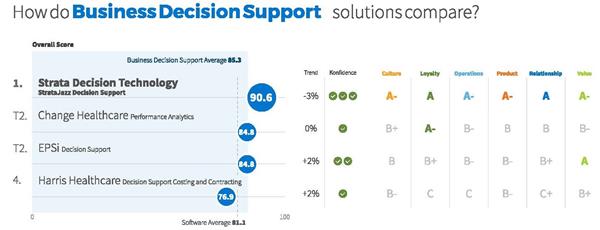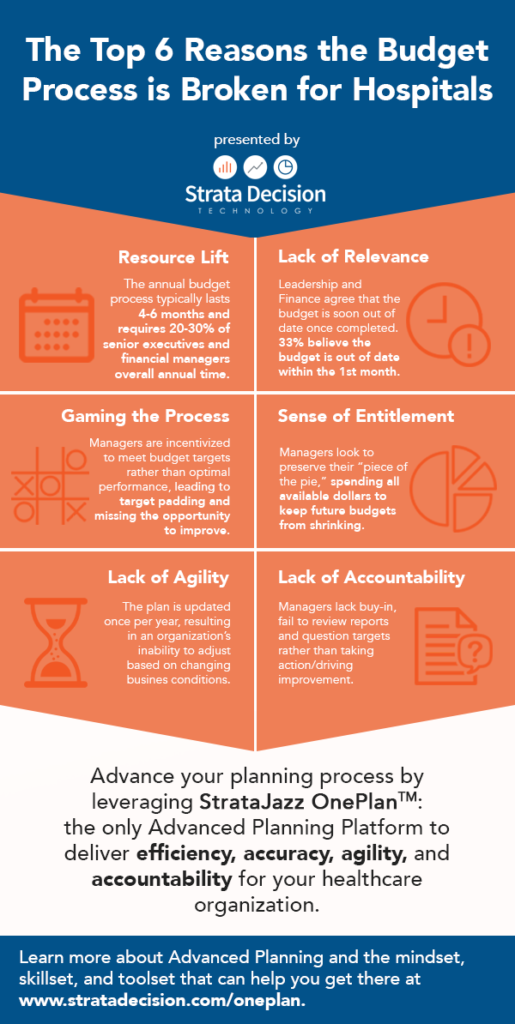CHICAGO, Jan. 31, 2020 (GLOBE NEWSWIRE) — Strata Decision Technology (Strata), a pioneer and leader in the development of cloud-based financial planning, analytics and performance tools for healthcare, announced today that the company’s StrataJazz® application earned top honors as the KLAS Category Leader for Business Decision Support in the 2020 Best in KLAS: Software and Services report, with a score of 90.6 out of 100.
This is the sixth consecutive year that StrataJazz has earned the coveted No. 1 spot in KLAS’s end-of-year ranking of healthcare IT software and services vendors. The annual Best in KLAS ratings are based on feedback from healthcare providers in tens of thousands of interviews conducted throughout the year. Top findings from this year’s report include:
- 97.9 percent of Strata customers say StrataJazz is “part of their long-term plans” – a score that is over 10 points higher than the average for business decision support solutions reviewed by KLAS
- 97.9 percent of Strata customers say they would buy StrataJazz again – a score that is over 20 points higher than the segment average
“Providers and payers demand better performance, usability, and interoperability from their vendor partners every year,” said Adam Gale, President of KLAS Research. “Best in KLAS winners set the standard of excellence in their market segment. Earning a Best in KLAS award should both excite and humble the recipients. It serves as a signal to providers that they should expect only the best from the winning vendors.”
The modular, cloud-based StrataJazz platform is currently used by over 1,000 hospitals and 200 healthcare delivery systems across the U.S., providing a “financial flywheel” to better plan, analyze and perform, driving margin to fuel their clinical mission.
Strata is seen as the standard in the market for advanced cost accounting, the core component of business decision support. Over $4.0 trillion is spent on healthcare in the United States every year with close to $2.0 trillion of that spend flowing through hospitals and health systems. Currently, fewer than 10 percent of hospitals and healthcare delivery systems have advanced cost accounting systems capable of providing accurate cost data across the continuum of care. A recent Strata survey found 90 percent of those responsible for the delivery of care don’t know the cost of it.
“We are incredibly proud to be the No. 1 in KLAS for the sixth consecutive year, and especially to be recognized again by our clients for our ability to help them get accurate, accessible and actionable information on cost,” said Dan Michelson, Chief Executive Officer of Strata. “Hospitals and healthcare delivery systems have been flying blind when it comes to understanding the cost of care. We feel very fortunate to be able to help our customers tackle this challenge as they seek to improve financial and clinical outcomes, driving more value for their providers, their organization and the communities that they serve.”
Strata recently partnered with The Healthcare Financial Management Association (HFMA) to launch the HFMA-Strata L7 Cost Accounting Adoption Model™ (L7 Model), healthcare’s first roadmap to help healthcare providers access accurate cost data via the use of advanced cost accounting. Originally designed for 200 leading healthcare delivery systems, the L7 Model is now being open-sourced, making it available at no charge to all healthcare providers.
Comments from Customers
In determining its rankings, KLAS collects both quantitative and qualitative feedback from healthcare providers on the technologies they use. The following are selected, anonymous commentaries by Strata customers, reported by KLAS:
- “It is very unusual to hear a sales pitch from a vendor and actually get the product that was described, but we got what was advertised and more. That is a real strength of the Strata Decision Technology system. I would rate the product as better than perfect if I could.”
- “I would pick StrataJazz Decision Support a thousand more times. It is the right product, and the vendor relationship is right for us.”
- “What Strata Decision Technology has done with decision support and cost accounting is really fantastic. Strata Decision Technology has also done really well with the drill-down capability that shows me my profitability or my contribution margin at a service line level. This capability also lets me see data from the DRG, the doctors, and the community technology preview. That tool is just amazing.”
The KLAS recognition marks the culmination of a year in which Strata and StrataJazz received multiple industry awards and recognition. Notably, the Healthcare Financial Management Association (HFMA) awarded StrataJazz its coveted “Peer Reviewed by HFMA®” designation for the seventh consecutive year. The rigorous, 11-step process includes a Peer Review panel review composed of current Strata customers, prospects who have not made a purchase, and industry experts.
The full Best in KLAS report is available at www.klasresearch.com.
About KLAS
KLAS is a data-driven company on a mission to improve the world’s healthcare by enabling provider and payer voices to be heard and counted. Working with thousands of healthcare professionals, KLAS collects insights on software, services and medical equipment to deliver reports, trending data and statistical overviews. KLAS data is accurate, honest and impartial. The research directly reflects the voice of healthcare professionals and acts as a catalyst for improving vendor performance. To learn more about KLAS and the insights we provide, visit KLASresearch.com.
About Strata Decision Technology
Strata Decision Technology provides an innovative cloud-based financial analytics and performance platform that is used by healthcare providers for financial planning, decision support and continuous improvement. Founded in 1996, the Company’s customer base includes 1,000 hospitals and many of the largest and most influential healthcare delivery systems in the U.S. The Company’s StrataJazz® application is a single integrated software-as-a-service platform that includes modules for capital planning, continuous improvement, contract modeling, cost accounting, cost management, decision support, financial forecasting, management reporting, operational budgeting and performance improvement and strategic planning. The Company’s headquarters are in Chicago, IL. For more information, please visit www.stratadecision.com.
Media contact:
Todd Stein
Todd Stein Communications
510-417-0612
[email protected]

